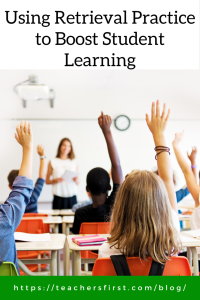Retrieval Practice is a learning strategy that involves recalling information as a tool to improve learning and retention. First discussed by Hermann Ebbinghaus in his 1885 book Memory: A Contribution to Experimental Psychology, a more recent book, Retrieval Practice by Kate Jones, explores classroom applications and methods to use retrieval practice to boost student learning.
What is Retrieval Practice?
- Retrieval practice is a strategy based on the concept of the testing effect. The theory behind retrieval practice suggests that recalling information from memory strengthens the memory traces associated with that information. It improves long-term retention and promotes a deeper understanding of the material.
- Retrieval Practice is a form of self-testing where learners actively try to retrieve previously learned information from their memory, which enhances long-term retention and strengthens learning.
Why is it an effective teaching strategy?
- Retrieval Practice helps identify gaps in knowledge, providing educators with information to guide further study and reinforcement of weak areas.
- Research indicates that Retrieval Practice strategies positively affect student performance regardless of reading comprehension and processing speed skills.
- Recalling information helps students connect new information and existing knowledge resulting in more effective learning.
- Retrieval practice helps students learn strategically by learning how to focus on important information.
- Students are actively engaged in the learning process when participating in retrieval practice strategies.
What do I need to know about implementing Retrieval Practice strategies?
- When practicing retrieval, learners make a deliberate effort to remember and reproduce the information without any cues or prompts. Use various methods, such as answering questions, solving problems, or summarizing key concepts from memory.
- Activities should provide feedback, be ongoing and spaced over time, and match upcoming assessments.
- Students should not have access to notes, textbooks, or other aids during retrieval practice activities.
- Activities may be individual or done with a partner or groups.
What are example activities?
- Brain Dump – complete this task using pencil and paper or on student devices. Ask students to write what they know about any topic or prompt. Share student responses as a means to share. Brain Dumps are an excellent way to begin or end a lesson as a schema activator or exit ticket.
- Cops and Robbers – in this activity, students write as much as they can from memory about a previously-covered topic within a set time frame, such as 3-5 minutes. When finished, students share their ideas with classmates, then “rob” an idea from a list created by another student. Use pencil and paper, ask students to share thoughts on Google Slides using this template, or see an example on Jamboard here.
- Quiz – encourage retrieval of information using focused quiz questions that encourage students to share information learned during the last lesson, last week, last month, and last year. Quizzes should be short, low-stress, and focus on students’ retrieving previously-learned information to apply toward understanding current lessons. This example uses Google Forms for students to think about strategies learned for adding 2-digit numbers.
- This slide deck created by French teacher Céleste Robillard provides many more examples of retrieval practice activities for you to adapt to your classroom needs.
Keep in mind that it isn’t necessary to overthink retrieval practice activities. Activities should not require much time; however, they should help students recall previously learned information and provide information on their current understanding of lesson materials.
Learn more about retrieval practice by attending the free OK2Ask: 3 Cool Tools for Retrieval Practice webinar on August 9, 2023, or find the recording in the OK2Ask archives.
Are you using retrieval practice strategies in your classroom? Perhaps you have some favorite tips and activities to share with our readers. We would love to hear your thoughts in the comments below as we learn together.


